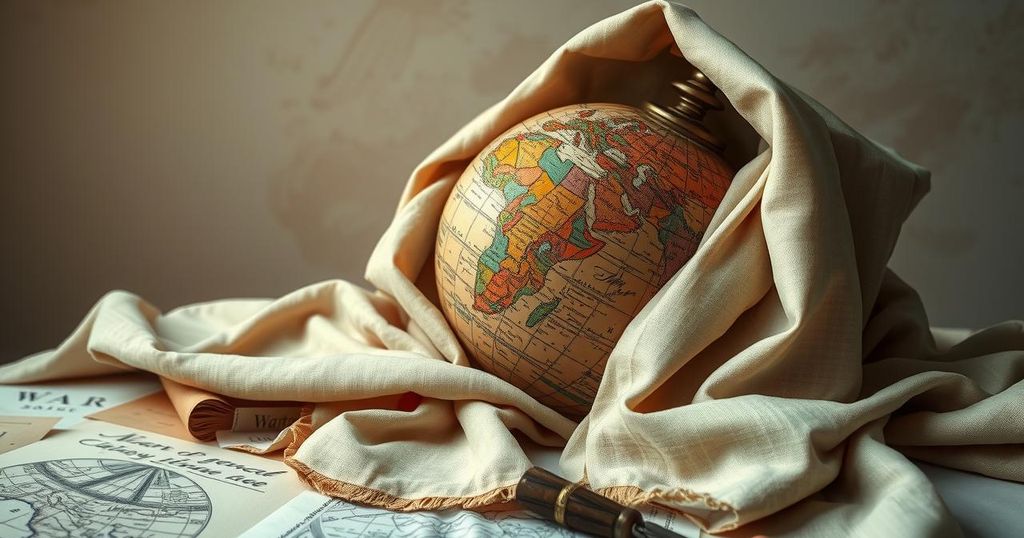Revitalizing Middle Eastern Narratives: A Review of Wyrtzen’s Work
Jonathan Wyrtzen’s “Worldmaking in the Long Great War” (2022) reinvigorates the historical narrative surrounding the Middle East’s involvement in World War I. The book highlights significant local struggles such as the Rif Wars and the Great Syrian Revolt that shaped the modern Middle East. Wyrtzen argues against the portrayal of the region as passive under colonialism, detailing the impact of indigenous victories and religious movements in resisting foreign domination.
The book “Worldmaking in the Long Great War: How Local and Colonial Struggles Shaped the Modern Middle East” by Jonathan Wyrtzen, published by Columbia University Press in 2022, repositions the Middle East in the context of World War I. It highlights the region’s influential developments that are often neglected in mainstream historical narratives. Wyrtzen presents a comprehensive analysis of the factors contributing to the Middle East’s modern identity through significant events from 1911 to 1934, encompassing a geographic range from Morocco to Iran.
Wyrtzen asserts that World War I was an unpredictable period in which multiple futures were conceivable for the Middle East, rejecting the notion of the region as merely a passive recipient of European colonialism. He meticulously examines local revolts, such as the Rif Wars, the Kurdish struggles, and the Great Syrian Revolt, elucidating how these uprisings contributed to the modern state of the region, with echoes apparent in contemporary conflicts including Da’esh’s actions.
The text emphasizes historical misconceptions, noting that events like the Senussi victory at Gasr Bu Hadi in 1915 and various Arab victories against colonial powers predate the widely regarded Dien Bien Phu (1954) as the first indigenous military success against entrenched Western forces. This reinterpretation suggests a longer history of resistance and agency within the region.
Wyrtzen’s exploration extends to the role of religious movements in these anti-colonial struggles. The Sheikh Said Rebellion caught international attention, while the Senussi movement in Libya exemplified the fusion of religious practices to combat colonial rule. Additionally, Mussolini’s ambitions in the Middle East are addressed, particularly his attempts to connect with Yemen’s Imamate for strategic advantage.
Particularly noteworthy is Wyrtzen’s in-depth examination of French colonialism in Syria, presented in a manner rare for English-language literature. Concurrently, the account of Ibn Saud’s consolidation of power in Saudi Arabia is recounted but remains familiar territory for historians. However, a broader scope could enhance the narrative by including other regions such as Somalia and Afghanistan, showcasing additional resistance movements.
Additionally, the discussion of the Somali uprising led by Muḥammad ibn ‘Abdallāh Hassan illustrates the long-lasting implications of interwar conflicts. Wyrtzen situates his work within a broader historiography that positions the Middle East at the core of World War I, as opposed to the periphery, supported by insights from texts such as Sean McMeekin’s work on the Russian origins of the war.
Ultimately, “Worldmaking in the Long Great War” underscores the significance of local actors in shaping the Middle East’s borders and political structures, challenging previously held perceptions of the region’s history. Wyrtzen’s meticulous research and insights into lesser-known documents open pathways to reconsidering pivotal moments in history that could have altered its course dramatically, serving as an essential read for those interested in colonial studies and Middle Eastern history.
The Middle East’s role during World War I has often been understated in historical narratives, leading to a lack of comprehensive understanding regarding its significance. Recent scholarship seeks to re-establish the importance of this region by examining key events and local struggles that influenced the modern political landscape. The book by Jonathan Wyrtzen fits within this context, highlighting crucial components often overlooked by traditional histories in favor of more romanticized narratives surrounding figures like Lawrence of Arabia.
“Worldmaking in the Long Great War” challenges conventional views regarding the Middle East’s representation in World War I history. By uncovering the active role played by local actors and their struggles against colonial powers, Wyrtzen sheds light on the formative influence these events had on the region’s modern identity. Elevated narratives position the Middle East at the heart of historical discourse, inviting readers to engage with a deeper understanding of its tumultuous past and its ongoing repercussions today.
Original Source: manaramagazine.org




Post Comment